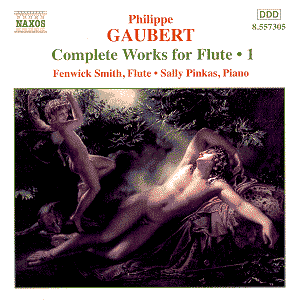Between the wars, Gaubert
was at the epicentre of French musical
life, professor of flute at the Paris
Conservatoire and principal conductor
of both the Paris Opéra and the
Société des Concerts.
As a composer, Gaubertís reputation
is far less central. An assimilator
rather than an innovator, his charming
music is redolent of the world of Franck,
Ravel and Debussy. As a flautist by
training, the flute features heavily
in Gaubertís oeuvre and his fourteen
works for flute and piano remain some
of his best known works.
This disc is promised
as Volume 1 of his complete works for
flute and piano. For this first volume,
flautist Fenwick Smith and pianist Sally
Pinkas are joined by a number of other
artists to perform a group of Gaubertís
flute-centred chamber works. In addition
Smith and Pinkas perform two of Gaubertís
flute and piano works.
The disc opens with
the short Madrigal for flute
and piano, an example of one the charming
miniatures at which Gaubert excelled.
The Trois Aquarelles are the
first of Gaubertís trios for flute,
cello and piano Ė each movement a delicately
etched tone-picture (Par un clair
Matin; Soir díautomne; Sérénade).
The last movement evokes echoes of the
Middle East. Fenwick Smith has an attractive
warm tone and Pinkas is a responsive
accompanist. Between them they make
a fine case for these works, seeming
to play them from love. Joined by Andrew
Pearce on cello, for the trio, the three
of them make a fine ensemble.
The Divertissement
Grèc expands on the traditional
coupling of flute and harp by adding
a second flute. Both flautists (Jacques
Zoon and Fenwick Smith) play on wooden
flutes, adding to the atmosphere in
this lovely little piece. The song,
Soir Païen is the only song
on the disc. Charmingly sung by Jayne
West, it made me wish that more vocal
works had been included.
The Tarantelle
for flute, oboe and piano, was Gaubertís
first published piece and it is dedicated
to Gaubertís flute professor, Paul Taffanel.
For this trio, Smith and Pinkas are
joined by the oboe of John Ferrillo.
Another trio, for flute,
violin and piano, follows. Médailles
Antiques comprises a pair of neo-classically
inspired tone pictures (Nymphes à
la fontaine and Danses) with
some very Ravel-inspired moments. The
final piece on the disc is the most
substantial: the Suite for flute
and piano. The four movements of this
work mix neo-classical images with further
exotic, middle-eastern moments.
These works are all
captivatingly charming and are delightfully
played by Smith, Pinkas and their friends.
No-one would claim Gaubert for a lost
genius of French music, but his undoubtedly
civilised talent is work exploring.
I cannot help feeling though, that if
this disc had been called Soirs Païens
Ė Romantic chamber music by Philippe
Gaubert rather than the prosaic
ĎComplete Works for Flute Ė Ií, it might
have tempted more people to explore
Gaubertís world.
Robert Hugill
see also review
by Colin Touchin


